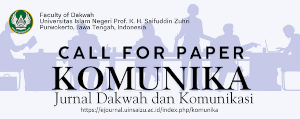RELASI PSIKOLOGI DAN AGAMA
DOI:
https://doi.org/10.24090/komunika.v9i1.836Keywords:
Relasi, Agama, PsikologiAbstract
Human beings and their religious behavior are interesting to study. Religion is sacred that it energizes its followers to obey any determined rule. For the outsiders, human religious behavior is frequently not understandablebecause of its contradictions. For that reason, a psychological approach is offered to understand such a phenomenon. This article, using a descriptive approach, is trying to analyze the relation between psychology and religion. In this case, there are some relational patterns between psychology and religion including critical-evaluative, constructive, and dialectical relation. Manusia dan perilaku keagamaannya adalah sebuah kajian yang menarik. Agama sebagai sesuatu yang sakral senantiasa menjadi energi bagi pemeluknya untuk melakukan segala sesuatu yang menjadi aturanaturannya. Bagi pihak luar (outsider), perilaku keagamaan manusia (pemeluknya) seringkali tidak terpahami, karena segi-segi kontradiksinya. Di sini kemudian muncul tawaran pendekatan psikologi dalam memahami perilaku keagamaan pemeluknya. Artikel ini, dengan pendekatan deskriptif mencoba mengurai hubungan antara psikologi dan agama. Dalam hal ini, ada beberapa pola hubungan yang berkembang antara psikologi dan agama yaitu pola hubungan kritis-evaluatif, konstruktif, dan dialektis.Downloads
Download data is not yet available.
References
Abdullah, Amin. Studi Agama Normativitas atau Historisitas. Yogyakarta: Pustaka Pelajar, 1996.
Connolly, Peter, (ed.). Aneka Pendekatan Studi Agama. terj. Imam Khoiri. Yogyakarta: LKiS, 2011.
Maslow, Abraham H. Motivation and Personality. ed. 2. New York: Harper and Row, 1970.
Paden, William E. Interpreting The Sacred Ways of Viewing Religion. Boston: Bacon Press, 1992.
Pals, Daniel L. “Signund Freud: ‘Agama dan Kepribadian’â€, dalam Hans Kung, Sigmund Freud Vis a Vis Tuhan. terj. Edi Mulyono. Yogyakarta:
IRCISoD, 2003.
—————. Seven Theories of Religion, Terj. Inyiak Ridwan Muzir dan M. Syukri, Yogyakarta: IRCiSoD, 2011.
Rakhmat, Jalaluddin, Psikologi Agama Sebuah Pengantar, Bandung: Mizan, 2003.
Rolston, Holmes III, Ilmu dan Agama: sebuah Survei Kritis, Yogyakarta: UIN Sunan Kalijaga, 2006.
Smith, Huston, Ajal Agama di Tengah Kedigdayaan Sains, terj. Ari Budiyanto, Bandung: Mizan, 2003.
http://akhmadsudrajat.wordpress.com/psikologi behavior, dibaca tanggal 10 Juni 2015.
Connolly, Peter, (ed.). Aneka Pendekatan Studi Agama. terj. Imam Khoiri. Yogyakarta: LKiS, 2011.
Maslow, Abraham H. Motivation and Personality. ed. 2. New York: Harper and Row, 1970.
Paden, William E. Interpreting The Sacred Ways of Viewing Religion. Boston: Bacon Press, 1992.
Pals, Daniel L. “Signund Freud: ‘Agama dan Kepribadian’â€, dalam Hans Kung, Sigmund Freud Vis a Vis Tuhan. terj. Edi Mulyono. Yogyakarta:
IRCISoD, 2003.
—————. Seven Theories of Religion, Terj. Inyiak Ridwan Muzir dan M. Syukri, Yogyakarta: IRCiSoD, 2011.
Rakhmat, Jalaluddin, Psikologi Agama Sebuah Pengantar, Bandung: Mizan, 2003.
Rolston, Holmes III, Ilmu dan Agama: sebuah Survei Kritis, Yogyakarta: UIN Sunan Kalijaga, 2006.
Smith, Huston, Ajal Agama di Tengah Kedigdayaan Sains, terj. Ari Budiyanto, Bandung: Mizan, 2003.
http://akhmadsudrajat.wordpress.com/psikologi behavior, dibaca tanggal 10 Juni 2015.
Downloads
Published
2017-01-23
Issue
Section
Articles
License
Authors who publish with this journal agree to the following terms:
- Authors retain copyright and grant the journal right of first publication with the work simultaneously licensed under a Creative Commons Attribution-ShareAlike 4.0 International License that allows others to share the work with an acknowledgement of the work's authorship and initial publication in this journal.
- Authors are able to enter into separate, additional contractual arrangements for the non-exclusive distribution of the journal's published version of the work (e.g., post it to an institutional repository or publish it in a book), with an acknowledgement of its initial publication in this journal.
- Authors are permitted and encouraged to post their work online (e.g., in institutional repositories or on their website) prior to and during the submission process, as it can lead to productive exchanges, as well as earlier and greater citation of published work (See The Effect of Open Access).

























